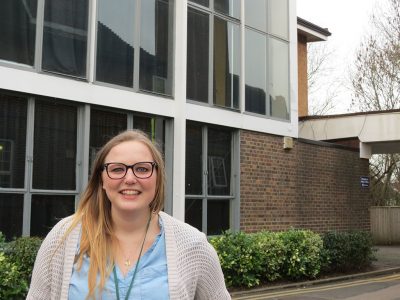
Jacqueline “Jackie” Rankin ’15 (ED), ’16 MA spent the fall semester of her master’s year in England as part of the Neag School’s Study Abroad Teaching Internship Program. In England, she taught students at Rooks Heath, a multicultural school in London with about 1,000 students ages 11 to 18. Rankin is a graduate of the Neag School’s Integrated Bachelor’s/Master’s program. She now teaches seventh- and eighth-grade math at Fred D. Wish Museum School in Hartford, Conn.
Hometown: South Windsor, Conn.
Concentration: Secondary education, mathematics
Compared with the student teaching you did previously in Hartford, Conn., how has teaching in London classrooms differed? “In Hartford, I thought I was in a diverse setting. But when we say ‘diverse’ here, it’s a whole new level. I have a Romanian student, a Turkish student. Neither of them speak English, but I’m teaching them math. You’re pulling out all the stops to learn how to teach them, and it’s a really rewarding experience.”
How do you prepare yourself to be able to teach people from all of these different backgrounds that you may not know anything about? “The big thing is to ask questions, and research something if you don’t know. So I did a probability lesson, and I was teaching about the probability of [pulling a specific] color of Skittles out of the Skittles bag. I had no idea if Skittles were halal or not. I was like, can my students eat these? Can they touch them? Here [in London], you have to be so aware, because every student deserves the same entry point. So if you’re doing an activity where they don’t have that access point, then you have to change it. I wanted to make sure that everyone could participate. For me, because I knew very little about the Islamic faith and the Muslim community, I educated myself, and I did the best I could so I was not making any faux pas.”
What has the coursework that is part of this internship program done for you? “It really helped me teach a cultural mindset, and to be aware that you are going to be dealing with kids from so many different backgrounds, whether it be race, religion, country, language, socioeconomic status. There are so many factors that make up a person’s culture that you are going to have to take into account and, as a teacher — to be a really effective teacher — you need to know how to deal with that on so many levels. So doing that here [in London] is incredible, because you get that wide range. … It’s taught me how to teach in a different environment, where you are forced to be more culturally aware.”
How have your your perspectives on the education system in the U.K. changed over the course of the semester? “When we first got here, it was very much like, OK, this is what I know about the United States; this is what I know about England. How is it different? What’s the same? I would constantly compare. Like this is how we teach math here; how do we teach math there? I was always comparing, comparing, comparing. And then as soon as we came on, it became less of comparing and more of, OK this is how it is; now let me figure out why that is. What is the purpose for this is, and what can I do with that?”
“There are so many factors that make up a person’s culture that you are going to have to take into account and, as a teacher — to be a really effective teacher — you need to know how to deal with that on so many levels.” Jackie Rankin ’15 (ED), ’16 MA
What kinds of lessons will you bring back with you to teaching in classrooms in the U.S.? “Here [in London], if the student’s doing the [math] problem wrong, you just say, ‘You’re doing the problem wrong.’ They’re OK with it. They don’t mind the criticism. They don’t get bogged down by getting it wrong; they want the help. That’s such a freeing thing as a teacher to be able to say, ‘You got it wrong.’ I see value in being straightforward with students. There’s no reason to tiptoe around it. I think I am definitely going to take that approach and be like, ‘All right, so you didn’t do this problem right. How are we going to fix it?’ I think that’s a good thing. The teachers here are very straightforward.”
What are you most proud of having accomplished during this experience? “Taking on a class by myself. Halfway through the semester, I was working with a year eight class, and their teacher left; they were working with a substitute. I was like, ‘Well, I was here with them for the entire first half, so let me step up and let me teach the class.’ I learned to take what I learned from teaching in the U.K., and what I learned from teaching in the U.S., and then doing a really good combined lesson. I took the best aspects of both.”
 Facebook
Facebook
 Twitter
Twitter
 LinkedIn
LinkedIn
